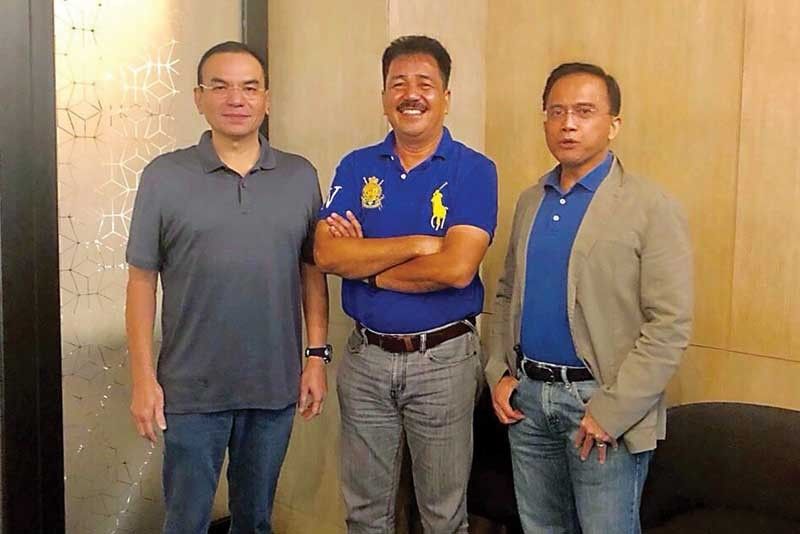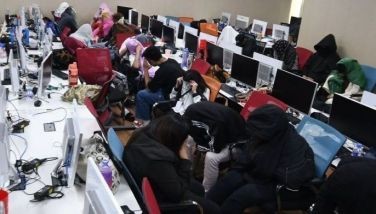PNP officials meeting with heads of 18 schools

MANILA, Philippines — The Philippine National Police (PNP) plans to hold dialogues with officials of 18 Metro Manila universities allegedly being used by the communist New People’s Army (NPA) to recruit students and gather support for the supposed Red October plot to oust President Duterte.
Director Guillermo Eleazar, National Capital Region Police Office chief, met with Commission on Higher Education (CHEd) Chairman Prospero de Vera III over the weekend to get some help in setting up the dialogues with either the presidents or leaders of the 18 universities and colleges.
The dialogue, Eleazar said, is important for the police to determine whether the communists are really recruiting students.
While stressing that it is fine for students to discuss activism or an ideology, he said it is a different situation when the talks are used to incite them to commit rebellion.
“We were also students sometime back and there were times when the topic of conversation was regarding an ideology or activism, which is allowed. But once you are inciting others to commit sedition, it would be a different matter,” Eleazar pointed out.
But PNP spokesman Chief Superintendent Benigno Durana Jr., talking with “The Chiefs” over Cignal TV’s One News last Friday, said that while Red October is a concern, it is not a serious threat.
“Their capability is not that strong, not that potent to topple the government, especially the government of President Duterte,” he said, referring to the communists. “Their desire to oust the government right now is just wishful thinking.”
The Armed Forces of the Philippines (AFP), during its budget hearing last week released a list of higher education institutions that are allegedly being used by the Communist Party of the Philippines (CPP) to recruit members.
This drew the ire of school officials, faculties and students organizations, which challenged the military to show proof.
Durana, echoing the position of PNP chief Director General Oscar Albayalde, warned educators against going beyond what they are allowed to teach students, stressing that “there is a limit to academic freedom.”
“It’s a possibility if you go overboard or beyond the law. There’s a limit to academic freedom. Though (teaching them critical thinking is) good in education of the students, it’s not a blanket authority for you to commit violations of the Revised Penal Code,” Durana said.
In the same program, University of the Philippines Diliman (UP-Diliman) chancellor Michael Tan branded Durana’s statement as dangerous and could lead to a witch-hunt of those critical of the government.
“It’s very subjective and that’s my fear. If showing anti-martial law (films) is suddenly equated with being subversive that can lead to any other thing. Any kind of comment can be interpreted as inciting to rebel. That’s martial law (all over again),” Tan explained.
The AFP claimed that recruitment happens during these film showings where events during martial law are compared with what is happening under the Duterte administration.
Filmmaker Hector Barretto Calma said these kinds of discussions are part of the discourse and should not be equated with CPP recruitment.
“Do they think students would be brainwashed after watching these films? It’s not that easy, the process of thinking of the students is critical. They would not just accept it as is,” Calma said in Filipino.
While Durana said there is nothing wrong with showing martial law films, admitting that this is important to teach students of what happened in the past, he noted that discussions, particularly the comparisons of the Marcos and Duterte administrations, are similar to communist propaganda.
Students, he said, should be provided with a balanced perspective accommodating all sides.
“Other than making our students aware of what happened during martial law and for us to guard our democracy from a repeat of the martial law, it should be coupled with educating students about right values, being a good student, being successful by studying properly,” he added.
Durana conceded though that this is already beyond the ambit of their mandate and their concerns are being discussed with CHED.
For Tan, film showings and the other activities that the state security forces are warning about are a significant part of the education of students.
“That is what makes a good university education,” he said, noting that critical thinking is a significant factor in the success of students. “You cannot claim to offer a good university education if you do not get students to think. It’s a matter of asking questions.”
Recognizing the role of parents, Eleazar said parents should also be concerned about what their children are doing in school and that parents should closely monitor the wellbeing of their children.
“The parents should know what their children are doing not only on their grades but also on other matters in schools,” he said, noting that the millennials are the most likely targets of recruiters.
He noted that parents play a vital role in preventing the recruitment of their children by communist rebels and encouraged them to seek help from both school management and the police if they suspect that their children are being recruited to become communist rebels.
“All parents have a simple dream for their children. We want our children to get good education, get a college diploma and become successful in their chosen fields of specialization,” Eleazar said.
Proper channels
He gave assurance that the PNP fully respects the academic freedom and civil rights of students and faculties, adding that the police are using proper channels and protocols in inviting the heads of the 18 private and state colleges and universities within Metro Manila to clear things up.
“We assure them that we will not take any action that would be misconstrued as an intervention or attack on academic freedom and civil rights of the students,” Eleazar stressed.
He added that he requested Durana, who was once a student of De Vera, to seek guidance in setting up the meeting as he hopes that this would be seen by officials of universities and colleges as proof of the PNP’s sincerity to work together in promoting peace.
Eleazar stressed that the police do not intend to go inside campuses to prevent any misinterpretation. He hopes his meeting with CHEd officials could be taken in good faith.
“We do not even intend to go inside any school so as not to further aggravate the already tense situation. I hope that my decision to meet with the good CHEd chairperson Popoy de Vera would serve as a proof to the presidents and leaders of the 18 colleges and universities that we are sincere in talking with them,” he pointed out.
De Vera, who was a professor at UP-Diliman before his appointment as CHEd head, assured the police of assistance and offered some insights on the controversial issue.
He added that he would “consult university presidents” on the PNP request for a dialogue and that he would call them to meeting within the next few days. – With Janvic Mateo, Cecille Suerte Felipe, Rainier Allan Ronda, Paolo Romero
- Latest
- Trending































